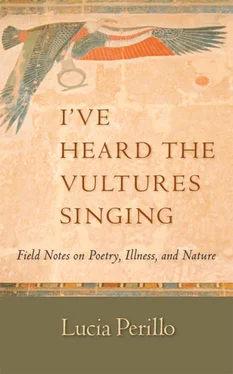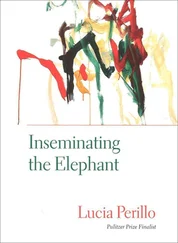Nevertheless, the local guide says the bird is found here. Its song is a random string of rising squeals that become unrecognizable once I focus my attention on them (the way water held in the hand disappears when you lift it up to study). Perhaps the game works best when thinking is suspended and the ancient core of the brain is allowed to take charge.
The thinking me asks: Is this game making you happy? And the answer is: No, no, you will never be happy. Best you can do is to fill yourself with the clutter of these distractions . It’s true that my nature usually feels the tug of gravity, that the fucking sunrise often makes me scream, what with the very idea of another day spent inside my fucking body. Sometimes the only thing that’ll get me out of bed is my anticipation of the sensual pleasure of coffee, the most urgent of my desires. And I can do coffee at the same time as I can do birdsongs, outside — though I carry my cup in my crotch and sometimes it spills, which is the reason for the brown splotches on my shorts, in the region of my private parts.
It’s not easy to be a bird-watcher when you can’t walk. I have to bend my neck at an even more awkward angle than your standard birder to squint up into the trees. I do best with species that are willing to hang around, unmoving, at eye-level in the shrubs. Lucky for me, a few birds fit these parameters. But not many.
Hence the attraction of their songs, which penetrate space and in so doing bring the birds to me, even if I can’t see them. All that is required is an open window, though on rare occasions I do coerce myself to leave the bed-lab and go outside at dawn, in the fleece costume that I’ve sewn to wrap around my tender shins.
The only thing I like about this picture, if I observe myself from outside myself (a daydream that’s generally a mistake to entertain), is the black leather fingerless gloves I wear to push the chair, which put me in mind of Zorro. This part of my costume serves a practical purpose, though to be consoled by it — to require it for my consolation — seems childish. Childish to need some visible sign to direct at the neighbors, to counteract my stillness at this hour when I see them in motion, speeding off in their cars to zoom down the craw of another day.
I live on a hill that overlooks Puget Sound, its most-southern pocket, which is called Budd Bay. It’s supposed to be the most toxic body of water in the state, though you can’t tell from looking at its surface, which is always changing in accordance with the moon and sun. Its one constant aspect is its beauty — even though, to my ears, the word beauty sounds cornily outdated. We’ve entered the “post-beauty” era now, since we know how beauty can divert our attention to the left when on the right some atrocity is happening.
Here, to the south, to the right of the bay, spreads a wooded ravine. The luck of having landed in this place sometimes embarrasses me, especially when I think of the ragged people sleeping under their wet blankets on the shore. I assuage my guilt by telling myself that these circumstances are some kind of karmic payback — don’t ask from what or whom — for my bad body-luck.
While the magnificence of this spot where I sit could only be improved by, say, an eagle swooping by (which happens from time to time), I’m also trapped here, because the road’s too steep for me to climb under my own steam. The topography limits me — at times when I don’t want to transfer to one of the motorized vehicles in my brigade — to a ten-by-ten-foot checkerboard of concrete and grass beside the driveway. This is my habitat now, bordered by a hazelnut tree whose fat leaves drape into the bird bath. A more patient woman could sit here until she’d trained the chickadees to eat right from her hand, and, while I like the idea of having such command over anything, I’m not sure this bird-taming would be conscionable from an environmental point of view.
In his book The Snow Leopard , Peter Matthiessen writes of encountering a crippled holy man: “Indicating his twisted legs without a trace of self-pity or bitterness, as if they belonged to all of us, he casts his arms wide to the sky and the snow mountains, the high sun and dancing sheep and cries: ‘Of course I am happy here! It’s wonderful! Especially when I have no choice!’” Whenever I feel claustrophobic in my grass-and-concrete checkerboard, I think about that holy man — how I should be more like him. But I also bet his cheery self-satisfactions would get irritating after a while.
My ravine contains a belt of maples that grew here after the old-growth cedars and firs were logged off years ago. The maples stand now eight stories tall, and they’ve become wrapped in English ivy, an invasive species, though we’ve snipped around the trees on our third-acre, so now their trunks are skirted with a wicker of dead stalks, which makes the trees look more in keeping with the post-beauty age. I call this place the Administrative Headquarters for the Empire of Crows, who I assumed were the birds waking up to emit not their normal caw but unforgettable screams that must accompany either murder or sex, though when I come more fully awake I never can remember the precise quality of the sound. It seems more suited to a word than a diagram, but I can’t remember the word — huyyAEEE? nyeahungAWWW?
At first I blamed the crows, but now I’m beginning to suspect the Steller’s jays, whose feathers on their black heads rise to one black spike pointing backward. I don’t know for sure because I can’t find those screams on the definitive tape, as if they were too horrible for the experts to include.
Though the ivy makes the habitat unnatural, my ravine is still a pretty wild place, especially considering that it’s just a few feet from the driveway. So far none of my friends has been willing to go to the bottom because the ravine’s walls drop off steeply, crisscrossed pick-up-stickwise by fallen trees covered in ivy. You set down your foot and find nothing there except a porous net of vines.
When I tell my friends, “Go down there as my emissary so you can report back to me,” they tell me to forget it.
“Don’t be afraid,” I say. “I’ve heard there’s old bottles in the bottom.”
No — they might break a leg.
Then I glance off the cliff of my shoulder and say something like: “Well, I was the kind of person who’d go down there.” That’s the ground truth of me — hear how supercilious I sound? Not that I know for sure about the “supercilious,” not that I can get to the bottom of myself and come back up with a verifiable object like a bottle, something I could hold for sure and study in my hand.
Ground-truthing is what biologists call entering an environment and actually surveying what is there via the senses of sight and sound. The advantage of sound is the way it pervades space — I don’t need to be able to hike down into the ravine in order to hear what’s inside it. Sound gives me not just a means for identifying the species that’s singing, but in so doing it also provides access, giving me a way of entering the ravine.
Because I’m not yet initiated in even the most basic songs, for now I’m just taking notes—

1. (raspy intercom malfunction)

2. (operatic robot)

3. (melodic whip, like a noodle sucked)
Then comes the frustrating chain of processes — to consult the tape, to consult the book of local birds, before the memories of the songs evaporate. These consultations are frustrating because they seem artificial, so painstaking and unlike me, so dependent on technology and therefore one step removed from nature. Also, I’ve learned that the notion of a “definitive tape” is a fiction, because birdsong is more variable than the tape would lead you to believe. Since many birds learn their songs from each other, local dialects bend the tune just as they bend people’s speech. There’s a thousand miles of subtle mutations between a vireo here in the Northwest and its song on the tape.
Читать дальше














![Various - Birds and Nature, Vol. 12 No. 5 [December 1902]](/books/745517/various-birds-and-nature-vol-12-no-5-december-thumb.webp)
![Various - Birds and Nature Vol. 11 No. 2 [February 1902]](/books/745533/various-birds-and-nature-vol-11-no-2-february-1-thumb.webp)